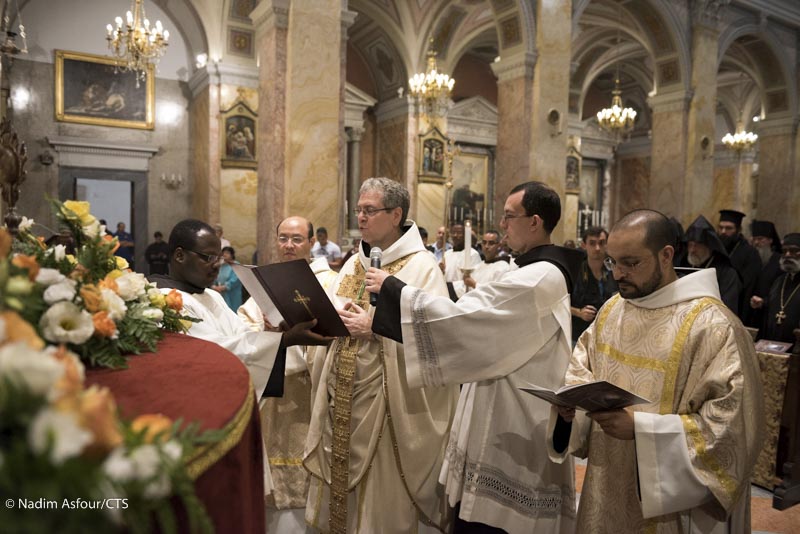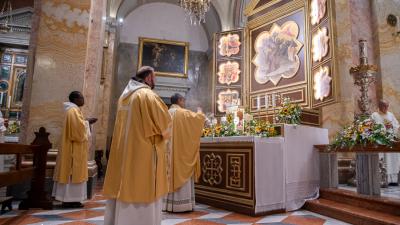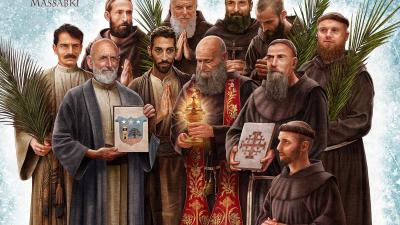
The statue of the patron saint of the Custody of the Holy Land stands to the left of the altar at St. Savior’s Church: it is St. Anthony, unmistakable with an open book in his hand and the Child Jesus in his arms, the two symbols that speak of his sainthood story, because he is famous for his preaching and his teaching of doctrine, and because he had a vision of the Child Jesus shortly before dying.
FEAST DAY IN JERUSALEM. The Custody of the Holy Land began to honor St. Anthony with the first Vespers on the afternoon of June 12 in the crowded Church of St. Savior in Jerusalem. The Custos of the Holy Land, Fr. Francesco Patton, in his homily recalled some of the fundamental passages from the Sermons of St. Anthony. Religious people are “called to be the heart of the Church,” and are “called to be plots that maintain coherence, profession and action.” “Anthony exhorts us to be coherent between what we profess and what we live,” said Fr. Patton, “only this way can our lives become splendid and luminous.” As per tradition, the distribution St. Anthony’s bread took place, which recalls the saint’s charity toward the poor. After kissing the relic, the Custos gave everybody a symbolic piece of bread.
The following morning, on June 13, the devotion of the faithful to this saint was manifested with a huge turnout at mass. Some children wore St. Anthony’s Franciscan habit, as is customary on this important solemnity. In an atmosphere of festiveness, the patron saint of the Custody was also celebrated by the heads of the churches of Jerusalem and by local civil authorities, who were sitting in the first rows of pews.
DEVOTION TO ST. ANTHONY.“With his holy life, Anthony reminds us that it is possible to live out the Gospel,” said the Custos of the Holy Land in his homily. St. Anthony, said Fr. Patton, was a model for his indefatigable prayer, for his preaching of the Gospel and for his closeness to the poor until his last day. Before the blessing, an important moment was the prayer of consecration of the Custody to the Saint of Padua: “Continue, dear patron saint, imparting on us those blessings that you draw from the Most Loving Heart of the Child Jesus, lovingly held in your arms.”
For refreshments after mass in the courtyard of the custodial curia, friars from different monasteries exchanged their well wishes for a good feast day. A child named George, who was wearing a St. Anthony habit, was in the arms of his grandmother. “It's great for us to be here, and this is the second time we attend,” said Maral, George’s mother. “Fr. Nerwan, our pastor, said a prayer when George removed the little habit. It is tradition to pray that the child will keep the Franciscan habit with him for a year and there are families who love to donate habits that the children wear for this feast.”
SAINT ANTHONY, THE PATRON SAINT OF THE CUSTODY. The Custody of the Holy Land officially chose St. Anthony as Patron in 1920, when Benedict XV proclaimed it, but the special relationship that links the saint of Padua to the Franciscans dates much further back. Some occurrences in 1917 confirmed the protection of the saint on the mission of friars in the Middle East. During the Anglo-Turkish conflict, all European citizens were expelled and even the friars, as Italians, were being forced to leave. The Turkish governor of Jerusalem, Giamal Pascia, ordered their arrest, but the Franciscans from all of the monasteries of the Custody prayed a series of three triduums in honor of the saint of Padua. On the morning of the third day of the triduum, the Patriarch of Jerusalem went to Giamal Pascia and received the grace for the friars, guardians of the holy places.
In November of 1917, the friars risked going to jail once again, but by the intercession of St. Anthony they were spared once again.
St. Anthony, Portuguese by birth (before becoming Br. Ferdinand), has been considered a miracle worker for centuries. On May 30, 1232, just 11 months after his death, Pope Gregory IX proclaimed him a saint, and since then he has never stopped working miracles and providing protection to anyone who invokes him.
Beatrice Guarrera




